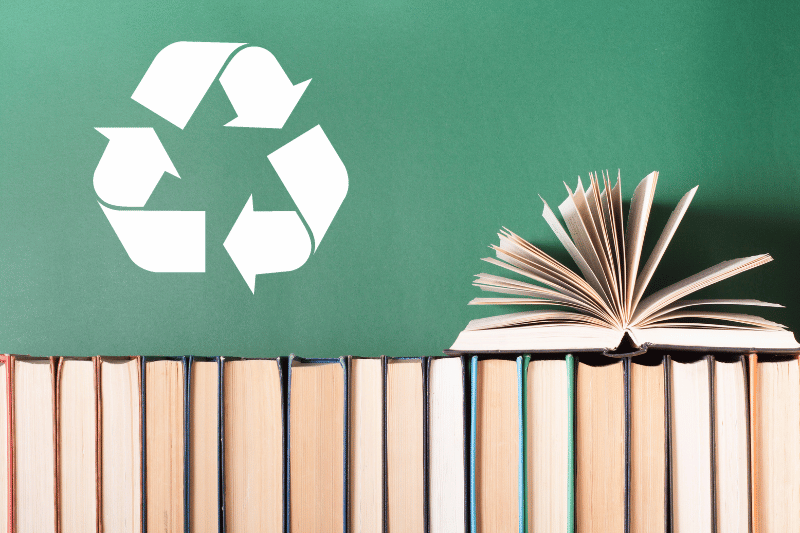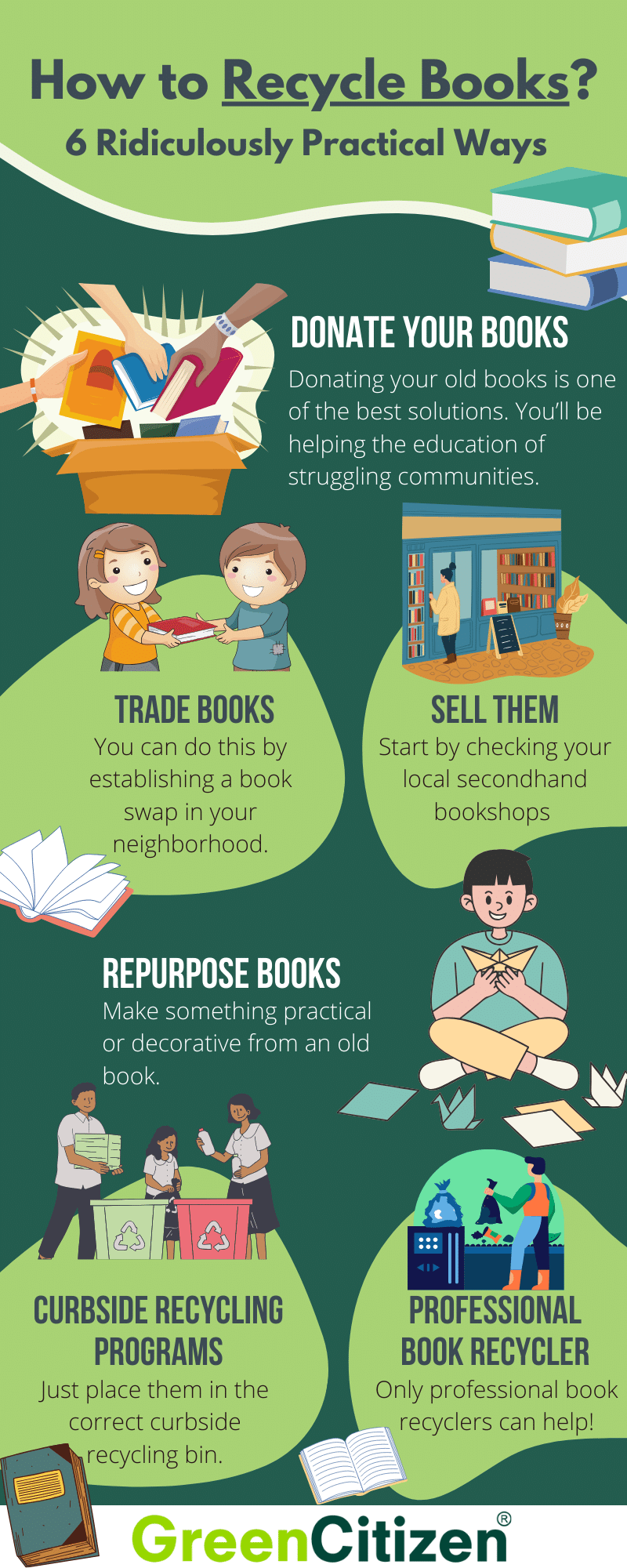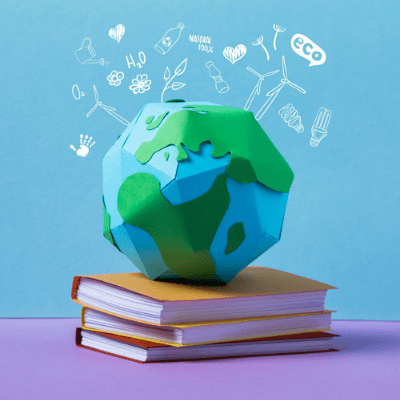Recycle books — it sounds simple, but it’s one of the most overlooked ways to reduce waste and preserve resources.
Even in today’s digital age, printed books aren’t going anywhere. In 2022 alone, Americans bought over 788 million books. But once those books are read, damaged, or outdated, most people aren’t sure what to do with them.
That uncertainty leads to a staggering problem: 320 million books end up in landfills every year. Meanwhile, many communities around the world still lack access to basic educational materials.
If we recycle books properly — or better yet, reuse and donate them — we can cut down on paper waste, save trees, and share knowledge more equitably.
In this guide, you’ll learn how to recycle books the right way:
- What types of books are recyclable
- Where to recycle or donate them near you
- And how to dispose of old textbooks and damaged volumes responsibly
Let’s turn clutter into impact — starting with your bookshelf.
Key Takeaway: How to Recycle Books
You can recycle books by donating them to libraries, schools, or charities, selling textbooks online, repurposing damaged volumes, or using curbside and professional recycling centers. Recycling books keeps them out of landfills, saves trees, and gives stories a second life through reuse and paper recovery.
Can You Recycle Books? (Paperback, Hardcover, and Leather Explained)
Yes, you can recycle books — but how you do it depends on the type of book. Some books go straight into the recycling bin, while others need to be disassembled or taken to a special facility.

Here’s how to handle each type:
Are Paperback Books Recyclable?
Yes — paperback books are the easiest to recycle. Their covers and pages are typically made from recyclable paper. Just toss them in your regular curbside paper bin after removing any plastic wrapping or glossy add-ons.
✅ Tip: If the cover has a plastic film or lamination, peel it off first for cleaner recycling.
Can You Recycle Hardcover Books?
Hardcover books can’t go directly into most paper recycling bins. The stiff cover is often made from materials like plastic, cloth, or leather — which aren’t recyclable with paper.
To recycle:
- Remove the spine and front/back covers
- Recycle only the internal paper pages
If you’re unsure, take the book to a local book recycling center or municipal drop-off site.
Can Leather-Bound Books Be Recycled?
No — leather-bound books are not recyclable in regular systems. Leather is a treated animal product and must be handled separately.
✅ Best Option: Donate to vintage bookstores, libraries, or collectors if the book is still in good shape. Otherwise, search for a mixed-material recycling facility that accepts specialty items.
How to Recycle Books Responsibly (6 Proven Ways to Reuse or Dispose of Old Books)
You can recycle books in several ways, depending on their condition and type. Old textbooks, paperbacks, and damaged hardcovers can be reused, donated, sold, or sent to a certified book recycler.
Below are six practical and eco-friendly ways to recycle books, reduce paper waste, and give unwanted books a second life.

1. Donate Your Old Books
You can donate books by giving them to local libraries, schools, thrift stores, or nonprofit organizations that distribute books to underserved communities. Donation is ideal for gently used textbooks, novels, and children’s books — especially if they’re clean, complete, and in readable condition.
✅ Best Places to Donate Books:
- Public libraries: Many accept donations for their shelves or annual book sales. Call ahead to ask what they accept (some restrict textbooks or encyclopedias).
- Schools and literacy programs: Great for donating age-appropriate children’s books and educational materials. Contact local school districts or after-school programs.
- Thrift stores: Chains like Goodwill, Salvation Army, and Habitat for Humanity ReStores often resell books to fund social programs.
- Shelters and prisons: Donate fiction and self-help books to domestic violence shelters, youth homes, or correctional facilities (call first for restrictions).
- Global nonprofits: Organizations like Books for Africa, Better World Books, and International Book Project ship books to regions in need. Some offer free shipping labels or drop-off bins.
🎯 Tip: Sort books by category before donating and remove damaged, moldy, or heavily marked items — most programs only accept books in good condition.
2. Trade Books Locally and Online (Best Book Swap Platforms and Ideas)
You can trade books by organizing a local book swap or using online platforms like PaperbackSwap and BookMooch. Book trading is a sustainable way to share stories, reduce paper waste, and avoid the cost of new books — especially for students and avid readers.
a. Local Book Swaps
Start a neighborhood book exchange at a local coffee shop, community center, library, or even a school campus or office lounge. These familiar and accessible locations encourage participation and build community spirit.
Use social media platforms or neighborhood apps like Nextdoor and Facebook Groups to spread the word and attract interested participants.
You can make it recurring — a monthly “Book Swap Sunday” — or set up a free-standing shelf in a shared space for ongoing exchanges.
b. Student Book Swaps
Students can save hundreds by trading textbooks within campus networks. Create a group chat or Google Sheet to:
- List available books
- Coordinate semester-by-semester exchanges
- Share condition notes and course relevance
Works best with recurring textbooks (math, science, lit classics).
c. Best Online Book Trading Platforms
- PaperbackSwap: Earn credits for every book you mail out. Use credits to request books from others. Only pay for outbound shipping.
- BookMooch: Point-based system. Trade internationally. Great for finding niche or out-of-print titles.
- BookCrossing: Leave books in public spaces with tracking codes. Less structured but fun and community-driven.
💡 Pro Tip: Before listing books, check their demand using the platform’s search tool. Avoid rare academic editions that no one wants.
3. Sell Old Books for Money
You can sell old books by listing them on online marketplaces like Amazon, eBay, and Facebook or taking them to local secondhand bookstores.
Whether you’re offloading old textbooks or fiction titles, book resale is a great way to reduce clutter and earn some extra cash while keeping books out of landfills.

a. Sell at a Local Independent Bookshop or Half Price Bookstore
Start locally by checking whether independent bookstores or national chains like Half Price Books accept used books. Most stores buy back recent novels, lightly used paperbacks, and nonfiction titles — especially if they’re in good condition.
Some offer cash, while others give store credit, so it’s worth comparing deals.
Keep in mind that these stores tend to be selective; books with torn covers, excessive highlighting, or missing pages are usually rejected. It’s a good idea to call ahead and ask about their current buying needs.
b. Sell Books on Facebook Marketplace
If local options are limited or your collection is more diverse, Facebook Marketplace can be a great alternative. This platform lets you sell directly to buyers in your area, with no fees or shipping costs involved.
Just note that most people prefer buying book bundles — grouping titles by genre or audience (like mystery novels or children’s picture books) makes listings more attractive and easier to sell.
c. Sell on Amazon and eBay
For textbooks and nonfiction titles, Amazon’s used book marketplace is a top choice. Their seller app allows you to scan the ISBN barcode and instantly see what a book typically sells for. Amazon charges a commission and expects sellers to handle shipping, but the exposure is unmatched.
Just be sure to grade your books accurately — options range from “Like New” to “Acceptable” — and avoid listing books with water damage, missing pages, or heavy annotations.
If you’re dealing with more specialized inventory, such as rare books or first editions, eBay gives you full control over pricing and listing terms. It’s a good platform for collectibles, language textbooks, or out-of-print volumes. While it requires a bit more work — including packaging and buyer communication — it’s ideal if you want flexibility and the potential to reach international buyers.
Overall, selling your used books is not just about making extra money. It’s also a way to support secondhand book markets, reduce paper waste, and make stories and knowledge accessible to someone new.
4. Repurpose Old Books (Creative and Sustainable DIY Ideas)
If a book is too damaged to sell or donate, repurposing it into something new is a smart and sustainable option. From home décor to gift wrap, old books can be turned into beautiful, functional items that keep paper out of landfills.
Pages from outdated textbooks or damaged novels can be used to make envelopes, bookmarks, or origami-style gift wrap. Torn or incomplete phone books are perfect for crafting personalized gift tags — simply cut out a square, decorate with stamps or markers, and attach with twine.
Decorators often upcycle vintage books into statement pieces: stack hardcovers to create a rustic side table or carve out the interior of a book to create hidden storage. Children’s books with illustrated pages make excellent wall art for nurseries or playrooms.
If you’re looking for inspiration, sites like Pinterest and Etsy are packed with tutorials on how to transform books into wreaths, lampshades, jewelry, and more. Just search “book upcycling” or “DIY book crafts.”
Repurposing books not only prevents waste — it adds a creative and personal touch to your space. It’s one of the easiest ways to support a zero-waste lifestyle while giving forgotten books a meaningful second life.
5. Recycle Books Through Curbside Recycling Programs
You can recycle books through curbside recycling programs — but only if they meet your local recycling guidelines. Most paperback books are fully recyclable and can go into your regular paper bin. However, hardcover books usually require some prep before recycling.
To recycle hardcover books, remove the spine and covers, which often contain non-recyclable materials like leather, fabric, or plastic-coated cardboard. Only the inner paper pages should be placed in the bin.
Magazines, catalogs, and phone books are also recyclable in many areas — but glossy or laminated covers may need to be separated.
If your local curbside program doesn’t accept books, check with your nearest recycling drop-off center or municipal waste facility. Many of them have special bins for mixed paper or books.
💡 Always check your city or county’s recycling guidelines, as curbside acceptance for books can vary widely by region.
6. Recycle Books Through a Professional Book Recycler
If your curbside program doesn’t accept books or you’re dealing with large volumes, professional book recyclers are your best option. These services ensure books are dismantled, sorted, and recycled properly — without sending them to landfill or exporting them irresponsibly.
Start by checking local recycling centers or municipal facilities with book drop-off programs. Some cities have designated bins for mixed paper, hardcover books, or school book donations. You can also use national directories like the Green Directory to find book recycling drop-off points near you.
If you prefer a mail-in option, companies like Better World Books and Book Scouter offer take-back programs for books in any condition. These organizations reuse what they can and pulp the rest for recycling, keeping paper in the loop and supporting global literacy efforts.
💡 Professional book recyclers recover high-quality fibers and reduce landfill waste — making them an ideal option for damaged or unneeded books.
Where to Donate Books Near You (Libraries, Charities, and Global Programs)
You can donate books by giving them to local libraries, thrift stores like Goodwill, literacy nonprofits such as Better World Books, or international programs like Books for Africa. The best place depends on the type of book you have — textbooks, novels, or children’s books — and the condition they’re in.

Here are some of the best options for book donations.
1. Local Libraries
Libraries are the pillars of a community, and many of them accept book donations. However, keep in mind that some libraries get large amounts of irrelevant books, so they may be strict about what donations they accept.
Also, some libraries don’t have enough shelf space, so they only accept books that they know will circulate regularly.
It’s best to contact your local library and ask them what books they need. Some libraries will also accept books they don’t necessarily need, such as magazines and other paper products, and will resell them and use the money to fund other programs.
2. Little Free Libraries
Little Free Library has book-sharing boxes that function on a book swap principle. There are over 32,000 little libraries across 50 states and other countries.
These are free-standing book cabinets, bigger than a mailbox. It doesn’t cost anything to take or donate a book to Little Free Library, and it’s a great way to help the community.
You can go to their official website and find a location near you.
Keep in mind these are smaller boxes, so they won’t fit a large donation. But, if you have a few books you want to give away, it’s a good choice.
3. Better World Books
This organization collects and sells donated books to fund literacy initiatives worldwide.
So far, Better World Books has made over $33 million for literacy and education. Just go to their website, and you too can be a part of their work.
Do you know the best part?
This company has recycled close to 400 million books so far!
4. Books Through Bars
You can also donate books to inmates.
Many prisons or detention centers accept books, especially fiction. They have libraries that inmates can use.
You can use a Books Through Bars program, which gives books to people in prison throughout the US.
5. Charity Programs
Two of the most popular charities are Goodwill and Salvation Army. They also accept books.
Goodwill has been around for more than 115 years. They help local communities by selling donated items and using the proceeds to fund career training, childcare, and education for people in need.
Goodwill has locations all over the US, so you can check their website for the one closest to you.
The Salvation Army also accepts books, even textbooks. The donations go to the Salvation Army Family Stores. Like Goodwill, they also use the funds they raise to fund programs that help people in need.
Goodwill and Salvation Army are always great choices for book donations, but you can find other charities and thrift stores in your area that conduct book drives as well.
6. Literacy Programs and Schools
When it comes to literacy programs, you can donate to local or global ones.
If you want to donate locally, check out the Laundry Cares.
They sponsor a laundromat literacy program. Laundromats have reading corners, so people can read books while waiting for their clothes to be washed.
Or, you can donate globally. A good organization is Books for Africa.
They accept almost all kinds of books and ship them exclusively to Africa to help the education of people who live there.
If you want to donate to a school, start by talking with schools in your area and see if they need any specific books for their student bodies.
Schools always want classic books on school reading lists. These get snapped up very fast, especially once the hold list gets long.
Apart from schools, you can donate books to local daycare centers.
Where Can I Recycle Books Near Me?
If your books can’t be donated, the next best option is recycling. The easiest ways are through curbside programs (for paperbacks and some magazines) or by dropping them at a professional book recycling center. These services ensure books are processed correctly and kept out of landfills.
Curbside Recycling
Many curbside programs accept paperbacks, magazines, and phone books. Hardcovers usually need prep — remove the spine and covers before placing the pages in your bin. Always check your city’s recycling guidelines, since rules vary by region.
Book Recycling Centers
If curbside isn’t available or you have a large number of books, a dedicated recycling center is your best option. These facilities break down books into pulp and recover the paper fibers for reuse.
You can use the Green Directory to find nearby book recyclers:
- Type “books” into the search bar
- Enter your zip code
- Choose a distance radius (5–500 miles)
- Instantly see local recycling options

Professional recyclers are equipped to handle textbooks, hardcover bindings, and mixed materials that curbside bins can’t. By recycling books properly, the paper is reprocessed into new paper products, saving trees and reducing landfill waste.
Why Is Recycling Books Important?

Recycling books helps reduce landfill waste, prevents toxic emissions from incineration, and saves trees by reusing paper fibers. Every year in the U.S., more than 640,000 tons of books are sent to landfills — that’s about 320 million books taking up limited space.
When books are burned instead of recycled, they release carbon and harmful chemicals, including dioxins, which can pollute soil, water, and air. Recycling keeps these pollutants out of the environment and ensures that paper fibers are recovered for reuse.
The impact on forests is equally significant. It takes roughly one tree to produce 25 books, so recycling even a handful directly contributes to tree conservation. Recycled books are pulped, cleaned, and turned into new paper products like notebooks, packaging, or office paper — extending the life of the resources that went into making them.
Recycling books isn’t just about clearing space on your shelves — it’s about protecting ecosystems, conserving natural resources, and ensuring your old stories continue their journey as something new.
Can You Recycle Magazines?
Yes, most magazines are recyclable through curbside programs, but it depends on the type of glossy coating used. Modern magazines are usually printed on recyclable paper with soy-based inks, so they can go directly into your blue bin. However, if a magazine has a heavy plastic-like cover or laminated finish, that should be removed first. Staples don’t need to be taken out — recycling facilities filter metals during processing.
If your curbside program doesn’t accept glossy paper, check with local recycling centers or drop them off at a professional recycler. You can also repurpose magazines for crafts, vision boards, or classroom art projects.

Frequently Asked Questions (FAQ)
Yes, you can recycle hardcover books, but it’s going to be more difficult than paperbacks. Check with your local recycling center before you put them in the recycle bin.
No, you shouldn’t throw away old books, as this creates waste. Sell them online or find a way to recycle them.
Many online places will buy used books, and even magazines, such as eBay, Abebooks, and Amazon.
You can dispose of old encyclopedias by donating them to local schools or libraries. Check with the local charity if they accept donated encyclopedias or throw a garage sale.
You can put books in paper recycling if the recycler accepts it. It really depends on the recycler. Contact your waste hauler or city to check.
First editions, signed books, inscriptions with content, historic atlases are among old books that are worth money. To check the value of your book, go to Abebooks.
What to Do With Old Books (Final Tips)
Recycling books keeps them out of landfills, saves trees, and ensures that stories and knowledge continue to benefit others. Whether you donate to a library or school, sell textbooks online, repurpose damaged volumes, or use a recycling center, every option makes a difference.
The best choice often depends on your book’s condition: donate if it’s still useful, recycle if it’s beyond repair. By taking a small step with your own bookshelf, you’re reducing waste, supporting literacy, and helping the planet.


